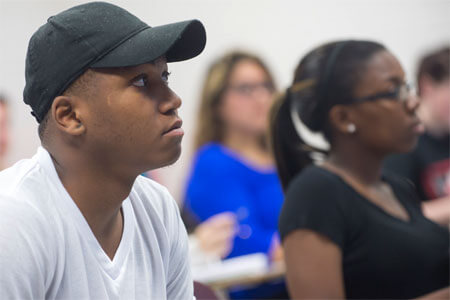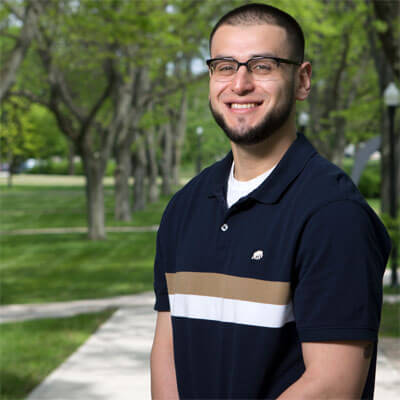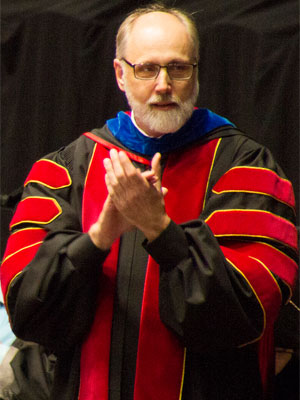Josiel Marrufo considers himself fortunate to enjoy the presence of mentors in his life.
The first-year graduate student in the NIU Department of Counseling, Adult and Higher Education (CAHE) paid it forward this spring – and earned internship credit in the process.
Marrufo served as a team leader and assistant program coordinator with “There’s A Place for You @ NIU,” an initiative created and offered this semester by his department to encourage NIU undergraduates from underrepresented populations and all majors to pursue graduate school here.
“As a first-generation student myself, I think that many students just don’t have the confidence. They might not feel like graduate school is for them, or that it might be too difficult,” says Maruffo, who holds a bachelor’s degree in Spanish with a minor in kinesiology.
“We let them know that it is for everybody – and that it’s possible,” he adds. “For me, I had some pretty close friends who attended the Adult and Higher Education program, and I got some insight from them. I was blessed to have that guidance.”
Forty-one Huskie juniors and seniors participated in the inaugural “There’s A Place” project, funded by a grant from the NIU Foundation.
Students attended workshops on test preparation and the application and matriculation process, mentoring events and panel discussions led by faculty and by current graduate students. They shadowed graduate students and sat in their classes for the best-possible glimpse of grad school life.
 They learned about the rigorous and independent structure of graduate school, its higher expectations and its insistence that students quickly acquire new skills as well as “new ways of being that many not have been modeled by anyone before in (their) familiar environment.”
They learned about the rigorous and independent structure of graduate school, its higher expectations and its insistence that students quickly acquire new skills as well as “new ways of being that many not have been modeled by anyone before in (their) familiar environment.”
They heard about balancing coursework with graduate assistantships, personal lives, family obligations and outside jobs.
In the end, all were awarded scholarships totaling more than $10,000 – and all now can comfortably picture themselves going beyond the bachelor’s.
“They came in not knowing a lot about graduate school, other than maybe it wasn’t an option for them,” says Danae Miesbauer, academic counselor in CAHE. “They really then saw it as an opportunity – something they could do and become successful in. They made connections. They definitely realized the value of earning advanced degrees.”
“Our program,” CAHE Chair Suzanne Degges-White adds, “has been the light bulb: ‘Oh, I can do this!’ ”
# # #
 Brittanie Fourte, who recently completed her junior year as a political science major with a minor in community leadership and civic engagement, plans to graduate in May 2017 and move onto law school.
Brittanie Fourte, who recently completed her junior year as a political science major with a minor in community leadership and civic engagement, plans to graduate in May 2017 and move onto law school.
During a Feb. 18 networking event where students in the “There’s A Place” program mingled with current graduate students, Fourte met former NIU Student Trustee Raquel Chavez.
“She shared with me the path that she took to get into law school and what would be expected of me,” Fourte says.
“The one thing that I remembered most from our conversation what when she said, ‘If you’re not sure, don’t apply yet. You have to really want it, and have no doubts about it.’ That statement stuck with me because I was unsure – and, when she said that, I really didn’t know what I wanted to do at that moment. I knew she was right, because law school is expensive, and it isn’t easy.”
Fourte later attended a class taught by NIU College of Law Professor Yolanda M. King.
“I loved it,” she says. “Even though I didn’t know what they were talking about, I felt I was engaged in the conversation, and I was catching on to some things. After my class visit, I became more confident and motivated about my decision to go to law school.”
# # #
CAHE already boasts a highly diverse student population.
 Nearly half of doctoral students in counseling hail from underrepresented groups, as do about one-third of master’s students in that program. More than half – 53 percent – of doctoral students in Adult and Higher Education are from underrepresented groups. That percentage slips only six points in the master’s program.
Nearly half of doctoral students in counseling hail from underrepresented groups, as do about one-third of master’s students in that program. More than half – 53 percent – of doctoral students in Adult and Higher Education are from underrepresented groups. That percentage slips only six points in the master’s program.
But Miesbauer, along with Degges-White and Professor LaVerne Gyant, still saw a need – and not just in their college but across the campus.
Shifting demographics in the NIU region demand “that the university be prepared to successfully target and market to students who might not reflect the identity of the past,” they wrote in their program proposal.
“The strong commitment to social justice to career success of the university is articulated and enacted by the College of Education as we reach out and support the success of underrepresented students. This is an essential focus as we seek to attract students who might be first-generation college students as they begin to imagine becoming first-generation graduate students.”
Organizers reached out to the Asian American Center, the Center for Black Studies, the Latino Resource Center and the Black Male Initiative to invite students from all six undergraduate colleges; more than 80 expressed interest, 50 of whom began the program in January.
“If we’re looking at President Baker’s idea of Student Career Success, this is an opportunity to prepare them for success by getting them into graduate school. Many majors require a master’s degree to get a decent job,” says Gyant, a former director of the Center for Black Studies.
“When we’re working with underrepresented students, many of them are first-generation. They don’t have any idea about graduate school, how to prepare for it, where to go or who to talk to,” she adds. “We let them meet with professors and chairs of departments. They learned about what’s needed in their statements, and the need to prepare for the GRE. They saw the challenges, and what they need for success.”
Luis Santos-Rivas, director of the Latino Resource Center, has heard praise for the program from the students he recommended.
Such first-hand encounters with graduate school will help them to move forward in their careers, he adds.
“When you have a graduate degree, you have more chances to get a better job,” Santos-Rivas says. “The Latino population is growing, and it’s going to get more and more competitive. These students who get higher degrees will have better chances and will receive better positions in the job market.”
# # #
 Francarlo Resto, who recently completed his junior year in family and child studies in the College of Health and Human Sciences, emerged from the program more excited than ever about graduate school.
Francarlo Resto, who recently completed his junior year in family and child studies in the College of Health and Human Sciences, emerged from the program more excited than ever about graduate school.
“There was a quote that I have heard before that really meant a lot to me. It was that, ‘Your bachelor’s is for your parents, but your master’s is for you,’ ” Resto says.
“It’s funny to think that, a couple years ago, I never even thought about graduate school. Through some of my experiences here at NIU, I have realized that obtaining my bachelor’s is only the first step in my educational career – and I have so much more to achieve.”
Resto is grateful to have met Katy Jaekel, an assistant professor in adult and higher education, and for her “overwhelmingly joyful, charismatic and sincere” interest in helping him. The connections Jaekel provided could elevate Resto to the NASPA Undergraduate Fellows Program next year.
Like Marrufo, he’s paying it forward by encouraging others to think about grad school.
“My biggest takeaway from the program was to find a program that you love and go for it,” he says. “I know that there will be some challenges and hurdles that I will have to overcome, but I know that after I face those challenges, I will have one of the most rewarding experiences of my life.”
# # #
 Miesbauer, who holds a master’s degree in higher education, envisions a bright future for the 41 “graduates” of the “There’s A Place” program.
Miesbauer, who holds a master’s degree in higher education, envisions a bright future for the 41 “graduates” of the “There’s A Place” program.
“I loved how kind they were. There are so many who had been the less-fortunate at some point in their lives, and they have a sense of wanting to help others. They want careers that are fulfilling, rewarding and altruistic,” she says. “There are so many graduate programs that could put them in these positions.”
Degges-White was equally impressed by the students who completed the journey.
“They came very prepared. They took this very seriously. They took advantage of the opportunities they were being given. They were present and alive,” Degges-White says. “The gratitude amazed me. They really appreciated this. It was rewarding to see their enthusiasm and energy, and to foster their love, and pursuit, of knowledge.”
Those who were selected “knew they were special,” she says, “and they wanted to live up to that sense of accountability. That’s a lesson for all of us – to remember that this is about a student’s potential and possible growth.”
Marrufo, who expects to complete his master’s degree next May, shares their enthusiasm for lighting the way for those who follow.
“I really like the opportunity to work with students,” he says, “and I like having the ability to help underrepresented students to achieve whatever goals they have. I’m leading by example.”
That leadership – and those examples – have earned a seal of approval from his family in suburban Chicago Heights. The inspiration he has cast over the “There’s A Place” cohort also extends to his younger brother, who’s still in high school but making plans for college.
“My family is really proud of me for sticking through it all,” Marrufo says. “Their goal for me was always pursue my passions.”




